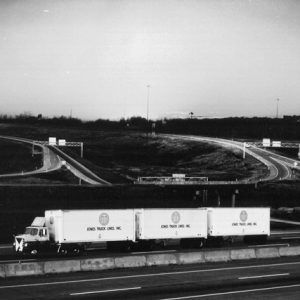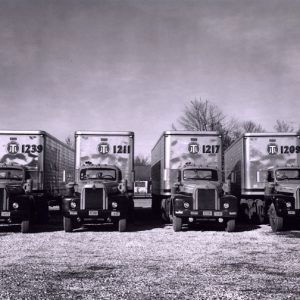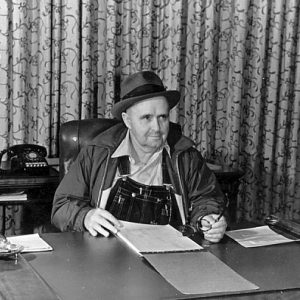calsfoundation@cals.org
Jones Truck Lines
Jones Truck Lines was a catalyst for change and growth in Springdale (Washington County). Established in 1918 by businessman Harvey Jones, the company made Springdale a regional center for the transportation of goods.
In 1918, Harvey Jones began hauling dry freight for individuals and businesses. Originally, he hauled hardware and groceries from Springdale to Rogers (Benton County) and Fayetteville (Washington County) with two mules and a wagon. Local business owners quickly discovered that they could place an order one day and have it delivered the next.
Jones sold his mules and wagon in 1919 and bought his first truck. When the Missouri and North Arkansas Railroad (M&NA) went on strike in 1920, Jones began hauling freight between Seligman, Missouri, and Eureka Springs (Carroll County)—a route that would have been served by the railroad.
Jones added more and more trucks between 1922 and 1928 and named his freight service Jones Transportation Company. In addition to freight, he hauled strawberries, grapes, and apples to Wichita, Topeka, and Kansas City, Kansas, as well as Oklahoma City, Oklahoma. By 1932, the service area was growing, and the company’s name was changed to Jones Truck Lines in 1933. A new terminal was built in Springdale. Additional terminals were established in Fort Smith (Sebastian County); Springfield, Missouri; and Joplin, Missouri.
In 1936, Jones Truck Lines bought twelve new International trucks, bringing the total number of units to thirty. The main business at this time was transporting meat from Swift & Company in Kansas City to Little Rock (Pulaski County), Fort Smith, Pine Bluff (Jefferson County), El Dorado (Union County), and Oklahoma City; the company loaded three to fifteen trailers per day from Swift & Company. Between 1941 and 1947, Jones Truck Lines opened routes into St. Louis, Missouri, and Memphis, Tennessee. While business slowed during wartime, the company’s resources were dedicated to delivering supplies to help the country’s war efforts.
In 1948, Jones Truck Lines acquired Breeding Motor Freight Line, which put the company into Oklahoma City, Muskogee, Henryetta, and Okmulgee, Oklahoma. Jones Truck Lines had become the largest privately owned carrier in the country. In 1951, Jones Truck Lines purchased two routes: one from Keystone Freight Lines through Oklahoma and Texas and an Oklahoma route into northeast Arkansas.
By 1954, Jones Truck Lines had covered a total of 9 million miles and, by 1957, had purchased the Dallas–Fort Worth Express routes to Wichita from Yellow Transit. A new corporate office was built in Springdale. In 1960, Jones Truck Lines had purchased Capitol Truck Line, which opened service into the Mississippi Delta area. The company employed more than 700 people at this time. In 1963, Jones Truck Lines had twenty-one terminals in eight states; five years later, travel exceeded 50,000 miles per day, and Jones employees numbered over 1,000. By 1979, additional routes had been purchased to Omaha and Lincoln, Nebraska; Denver, Colorado; Atlanta, Georgia; and Birmingham, Alabama. Jones Truck Lines had 2,300 employees and did $80 million worth of business that year.
In 1980, however, due to deteriorating health, Harvey Jones sold Jones Truck Lines, Inc., to Sun Carriers. The original terminal property in Springdale is now the home of the Jones Center, an educational and recreational facility.
For additional information:
“The Jones Legacy.” The Jones Center. https://www.thejonescenter.net/ (accessed March 14, 2022).
Springdale Exhibit. Shiloh Museum of Ozark History. Springdale, Arkansas.
Kara New
The Jones Center

 Jones Truck Lines
Jones Truck Lines  Jones Truck Lines
Jones Truck Lines  Harvey Jones
Harvey Jones 



I am proud to have worked for JTL in Jonesboro, Arkansas, in the 1960s. My brother, Dewey E. Morgan, retired from JTL. Pay was excellent.
Pretty much the way it has always been done, regardless of the race and so forth of the employee. What an employee invented while on the job was considered the property of the business, or the owner of the business. At least your grandfather got a little recognition; some never even get that.
My grandfather Floyd Kindall became the first black diesel mechanic at his company, Jones Truck Lines. At this job, he modified the weight scale for diesel trucks and their cargo so it would save everyone a lot of time. He received only $50 and a thank-you. For years, the company made millions and probably even billions.
Harvey Jones’s circa 1980s newsletter says this:
Dallas Mechanic Floyd Kindall noticed that about 250-300 trailers are weighed weekly. The way it was being done seemed time consuming to Floyd. The trailer would be pulled on the scale, the person would have to get out of the truck to check and see if his trailer was overweight then get back in. “With Floyd’s system the scales are pre-set for 20,000 lbs. Drivers stay in the cab, drive onto the scale and the lights come on if a trailer is too heavy. After analyzing the system local managers say it saves them as much as 30 hours a week.”
My grandfather wasn’t well educated at the time but had enough knowledge to modify a scale to save his company time and money. Shortly thereafter, Harvey Jones took his idea and patented it and then sold the company and retired, living a great life. Harvey Jones had no children and has given a lot back to Springdale, but my grandfather had a family to care for and received not much of anything.